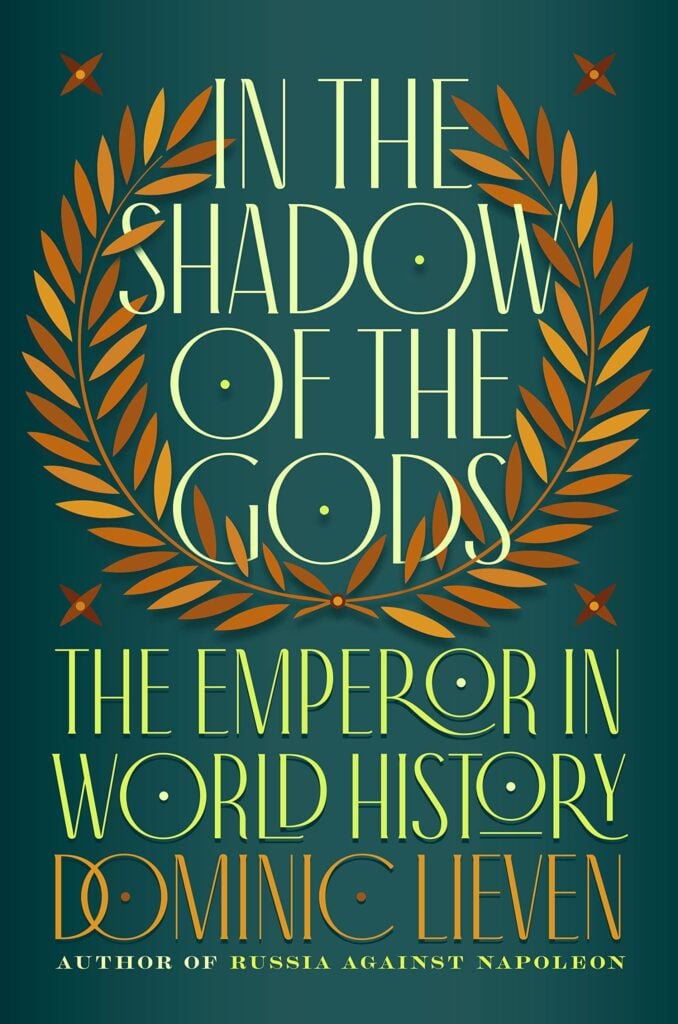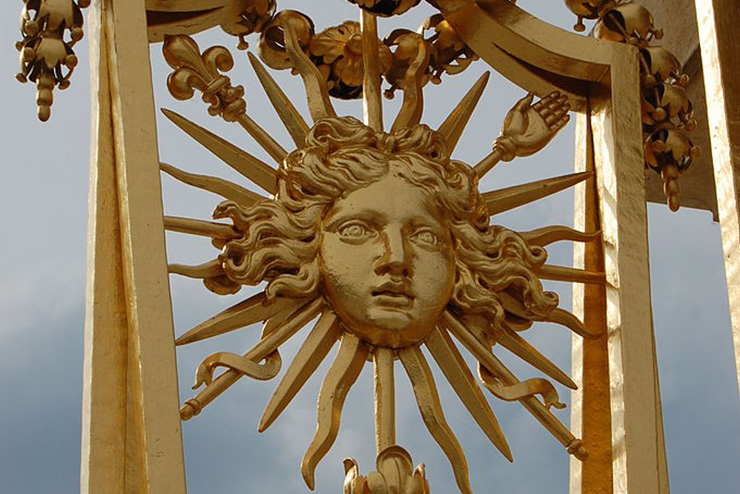
In the Shadow of the Gods: The Emperor in World History
by Dominic Lieven
Viking Books
528 pp., $40.00
In the battle for precedence between the “great man” view of history, which says history is made by influential individuals, and the structural views of history, which emphasize impersonal economic and demographic forces, an account of the world’s emperors across centuries and cultures feels like a defiant assertion of the older “great man” school. Cambridge historian Dominic Lieven’s excuse, if he needs one, is that even the most ancient empires and most remote emperors offer leadership lessons, and that individual agency is as important as impersonal forces.
The last truly imperial act was in 1945, when Japan’s Emperor Hirohito ended World War II. Legacies of empires surround us still, however, from Western controversies about immigration and slavery, to Russia and Ukraine’s competing claims to the steppes of the Donbas, and China’s coveting of Taiwan.
The author ranges ably from Sargon of Akkad to 21st-century Japan by way of China, Rome, India, Austria, Britain, Prussia, and other once grandly expansive hereditary monarchies. He also brings a special personal knowledge of Romanov history to his sprawling subject, as some of his ancestors were influential figures in the Russian imperial court. It is interesting to have such varied societies treated as a single subject, and Western readers are likely to learn much about the trajectories of Eastern empires.
Divergent though they were, all emperors aspired to govern large territories and diverse peoples over long periods. Some empires operated with tolerable efficiency over long periods without resorting to tyranny, and this appeals emotionally and intellectually to Lieven, given that he is a liberal-minded author of pan-European antecedents who is married to a Japanese, and has Jewish and Filipina in-laws.
Other empires were short-lived, and while some emperors were brilliantly humane, others were cruelly inept. But even the most egregious imperial failures fare well in comparison with the post-imperial modern world order, whose achievements and leaders are often even less impressive.
Empires were usually established by charismatic warriors, who could be brutally wolfish, like the Assyrians, or highly cultured, like Alexander the Great. China’s imperial saga, which informs the thought of current Chinese President Xi Jinping, was repeatedly revolutionized by brilliantly-led Turkic and Mongol hordes irrupting from the boundless steppes. The sky-god worshipping horsemen were romanticized in the West in plays such as Christopher Marlowe’s Tamburlaine the Great or Saint-John Perse’s epic poem Anabasis. They burst into China (and India, Turkey, and eastern Europe) from what Perse called the “great land of grass without memory,” burning settlements, stacking their late inhabitants in mounds, and supplanting their decadent dynasties.
Paradoxically the hordes were often absorbed into the settled cultures they conquered, which were so much more polished than what they’d developed under the canvas of their yurts. The Tang dynasty (618-907), China’s greatest, was half-Turkic, originating in the northern border regions that would later birth the equally enduring Manchus (1636-1912).
Empires that established something like orderly hereditary succession soon became characterized by custom and tradition, which eventually ran the risk of ossification and supplantation in their turn. Overly endogamous ruling families gradually ruled themselves out of contention. Pharaoh Tutankhamun, who was probably the product of three generations of intermarriage between close cousins, had a deformed foot and spine and died at age 18 after marriage to his half-sister. The Habsburgs were renowned (if at times exaggeratedly) for unattractive hereditary jaws and intellectual incapacity. Conversely, Russian tsars before Peter the Great “married down” into the gentry to refresh their lineage and avoid intrafamilial tension, while Ottoman sultans sometimes selected their heirs from sons born of slaves.
Many occupants of imperial thrones claimed to be descendants of gods, or at least divinely appointed. Peace and prosperity were signs of celestial approval of earthly arrangements, what Chinese thinkers called the “Mandate of Heaven.” Ying Zheng of the Qin dynasty, who united China in 221 BC, distinguished himself from lesser kings by terming himself Huangdi (“August Thearch”), embodiment of Buddhist and Daoist spirituality. Buddhism itself might have remained confined to the Himalayan foothills had it not been adopted by India’s Emperor Ashoka. Christianity could have remained a Near Eastern niche had it not been for Constantine. And the Arabs might have remained only regionally important had they not embraced Islam and envisioned a global Caliphate. Holy Roman Emperor Charles V derived authority from his real descent from both Charlemagne, Western Europe’s Christian unifier, and Godfrey of Bouillon, crusader-king of Jerusalem—as well as legendary descent from Noah. Into the 1960s, many Britons believed Elizabeth II had been chosen by God.
Empires often co-opted the features of their antecedents to bolster their pretentions; Russia saw herself as the Third Rome (“Tsar” derives from the Latin “Caesar”). The British hauled the obelisk Cleopatra’s Needle back to London in 1877 to suggest Anglo-Saxon analogies with Ancient Egypt. Empire builders were also often quick to harness new technologies. In the 19th century, trains and telegraphs were yoked to ancient acquisitiveness, counterintuitively expanding empires and reinforcing royal families even as democracy and nationalism were making radical inroads. New intellectual currents could also legitimize imperial aggrandizement, with Darwinian logic justifying the survival of the “fittest” empire in a global struggle for colonial resources. Kaiser Wilhelm II’s fascination with new technology contributed to tensions leading to World War I and the downfall of Europe’s empires, as he engaged in reckless naval brinkmanship with Britain, to strengthen his arriviste empire’s place in the sun.
Emperors and empresses could disappear for months into private quarters, and when seen were freezingly dignified, like the Thai kings of the 1680s who “sat on their thrones like gods,” according to ambassadors from France’s Louis XIV, himself sizzlingly resplendent as the Sun King. Distance must sometimes have lent popular enchantment, at least in good times— even in bad, troubles could be blamed on corrupt or inefficient officials (or eunuchs, or foreigners, or mistresses) rather than allegedly avuncular emperors. But cynicism flourished in courts, where cruelties, inefficiencies, and rulers’ private peccadilloes were evident. Not even demigods could be heroes to their valets, let alone their viziers.
Then there was vicious Realpolitik. In 813, the Arab Caliph of Baghdad, Al-Amin, was murdered by rebels allied with his brother. His brother was supposedly grieved by Al-Amin’s death, but coolly instructed his chief counsellor, “Use your ingenuity to find an excuse for it.” In 1687, after 46 years confined to the gilded prison of Constantinople’s Topkapi Palace, when Prince Suleyman was taken out to be proclaimed Sultan, he thought he was to be executed.
Many emperors are known only as names, expressionlessly masked and stiff in official portraiture. Their personal qualities, private dilemmas, and bitterest struggles were apparent only to confidantes or concubines. Countless doubtless fascinating conversations must have been lost to history and the pillow. Lieven nevertheless unearths much of interest from Ozymandian remains. India has the Baburnama, the unusually candid autobiography of the founder of the Mughal Empire, Bābur the Tiger. In the West, Marcus Aurelius’ Meditations have been used as a manual of statesmanship and philosophical primer since the 16th century, revealing an admirable compound of equipoise, intellectual curiosity, realism, and self-restraint.
Aurelius also had friends who gave honest advice, a wise counterbalance to courtiers’ natural tendencies to tell emperors what they wished to hear. The Qing emperor Kangxi used a secret network of informants from around his kingdom who reported to him in private. Louis XIV respected candour in his ministers, even when their news was unwelcome. Less shrewd rulers were often isolated by their own greatness, which ultimately made them less great. But even paragons inadvertently undermined their inheritors by setting standards of personal conduct, military skill, and political astuteness that lesser successors had trouble living up to.
The book’s afterword ends abruptly with an unfortunate afterthought that ritualistically denounces Donald Trump as the worst kind of postimperial politician. But then all postwar politics have an unsatisfactory ending, as we come to terms with the very recent vanishing of history’s most prevalent social order. This remains an excellently informed comparative history of some of the most powerful individuals ever to have lived.



Leave a Reply